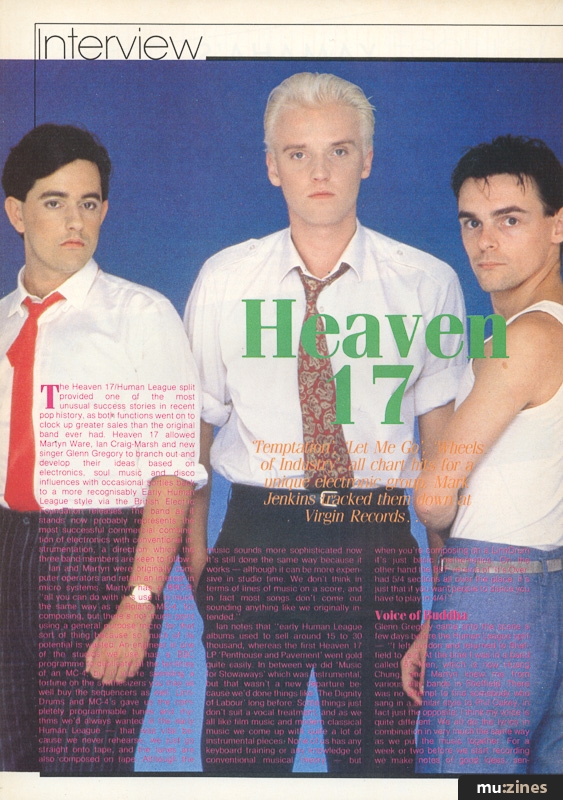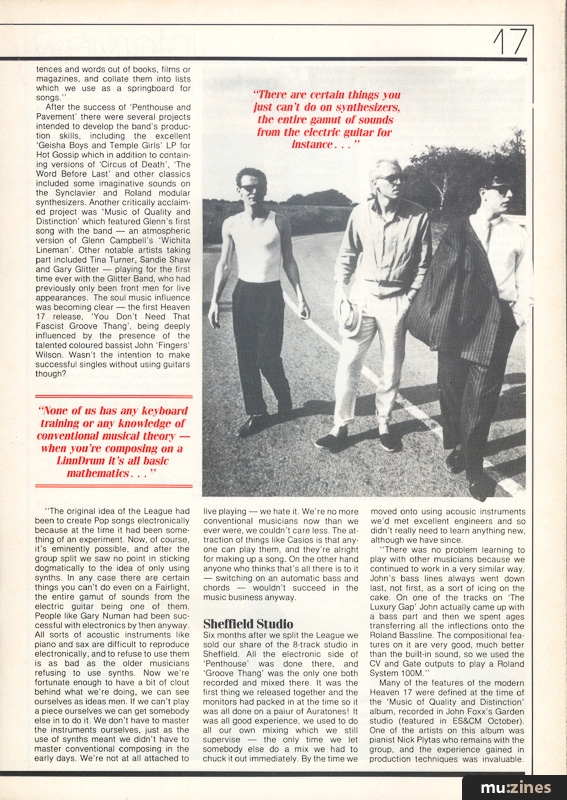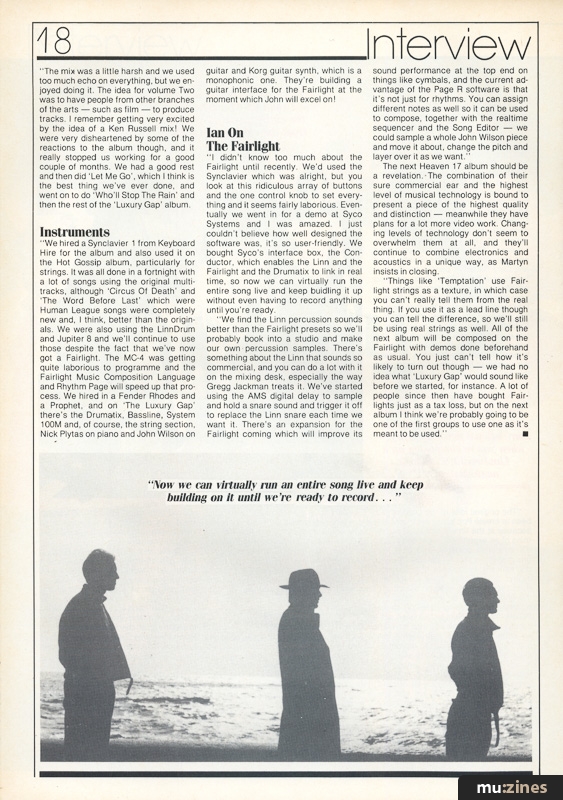Magazine Archive
Home -> Magazines -> Issues -> Articles in this issue -> View
Heaven 17 | |
Heaven 17Article from Electronic Soundmaker & Computer Music, November 1983 | |
Crushed by the wheels of technology?
'Temptation', 'Let Me Go', 'Wheels of Industry', all chart hits for a unique electronic group. Mark Jenkins tracked them down at Virgin Records...
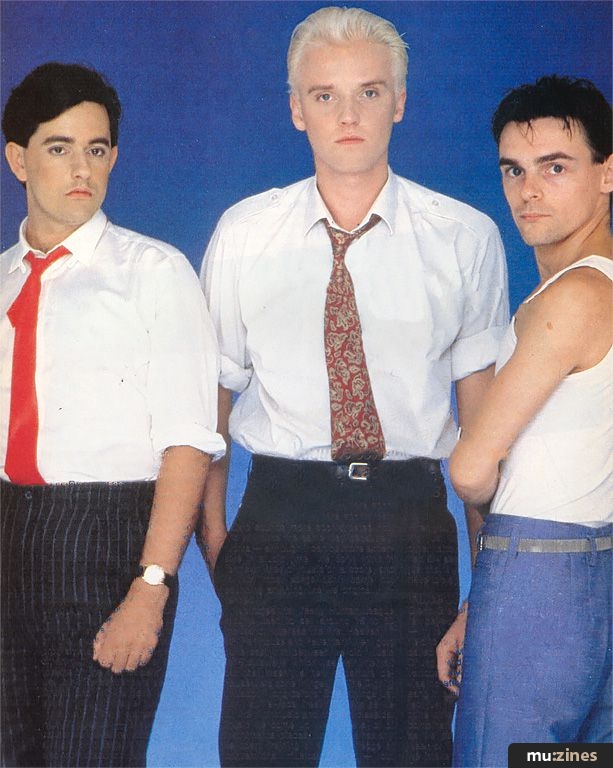
The Heaven 17/Human League split provided one of the most unusual success stories in recent pop history, as both functions went on to clock up greater sales than the original band ever had. Heaven 17 allowed Martyn Ware, Ian Craig-Marsh and new singer Glenn Gregory to branch out and develop their ideas based on electronics, soul music and disco influences with occasional sorties back to a more recognisably Early Human League style via the British Electric Foundation releases. The band as it stands now probably represents the most successful commercial combination of electronics with conventional instrumentation, a direction which the three band members are keen to follow.
Ian and Martyn were originally computer operators and retain an interest in micro systems. Martyn has a BBC-B; "all you can do with it is use it in much the same way as a Roland MC-4, for composing, but there's not much point using a general purpose micro for that sort of thing because so much of its potential is wasted. An engineer in one of the studios we use has a BBC programme to duplicate all the facilities of an MC-4, but if you're spending a fortune on the synthesizers you may as well buy the sequencers as well. Linn-Drums and MC-4's gave us the completely programmable tunes and rhythms we'd always wanted in the early Human League — that was vital because we never rehearse, we just go straight onto tape, and the tunes are also composed on tape. Although the music sounds more sophisticated now it's still done the same way because it works — although it can be more expensive in studio time. We don't think in terms of lines of music on a score, and in fact most songs don't come out sounding anything like we originally intended."
Ian notes that "early Human League albums used to sell around 15 to 30 thousand, whereas the first Heaven 17 LP 'Penthouse and Pavement' went gold quite easily. In between we did 'Music for Stowaways' which was instrumental, but that wasn't a new departure because we'd done things like 'The Dignity of Labour' long before. Some things just don't suit a vocal treatment, and as we all like film music and modern classical music we come up with quite a lot of instrumental pieces. None of us has any keyboard training or any knowledge of conventional musical theory — but when you're composing on a LinnDrum it's just basic mathematics. On the other hand the BEF version of 'It's Over' had 5/4 sections all over the place, it's just that if you want people to dance you have to play in 4/4!"
Voice of Buddha
Glenn Gregory came onto the scene a few days before the Human League split — "I left London and returned to Sheffield to join. At the time I was in a band called 57 Men, which is now Huang Chung, and Martyn knew me from various silly bands in Sheffield. There was no attempt to find somebody who sang in a similar style to Phil Oakey, in fact just the opposite; I think my voice is quite different. We all do the lyrics in combination in very much the same way as we put the music together. For a week or two before we start recording we make notes of good ideas, sentences and words out of books, films or magazines, and collate them into lists which we use as a springboard for songs."
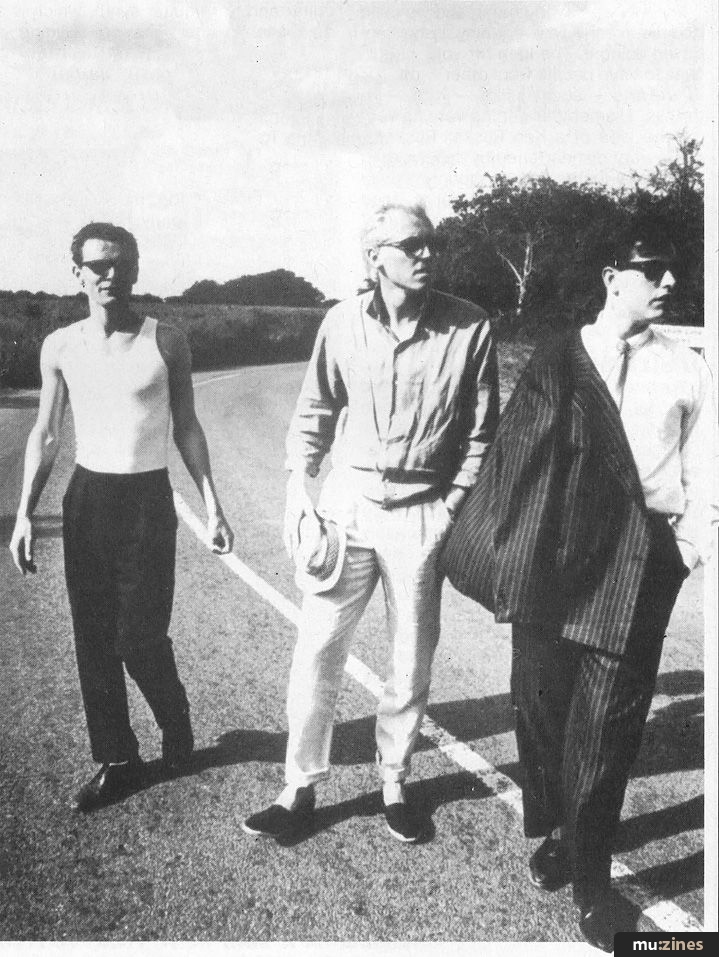
After the success of 'Penthouse and Pavement' there were several projects intended to develop the band's production skills, including the excellent 'Geisha Boys and Temple Girls' LP for Hot Gossip which in addition to containing versions of 'Circus of Death', 'The Word Before Last' and other classics included some imaginative sounds on the Synclavier and Roland modular synthesizers. Another critically acclaimed project was 'Music of Quality and Distinction' which featured Glenn's first song with the band — an atmospheric version of Glenn Campbell's 'Wichita Lineman'. Other notable artists taking part included Tina Turner, Sandie Shaw and Gary Glitter — playing for the first time ever with the Glitter Band, who had previously only been front men for live appearances. The soul music influence was becoming clear — the first Heaven 17 release, 'You Don't Need That Fascist Groove Thang', being deeply influenced by the presence of the talented coloured bassist John 'Fingers' Wilson. Wasn't the intention to make successful singles without using guitars though?
"None of us has any keyboard training or any knowledge of conventional musical theory — when you're composing on a Linn Drum it's all basic mathematics..."
"The original idea of the League had been to create Pop songs electronically because at the time it had been something of an experiment. Now, of course, it's eminently possible, and after the group split we saw no point in sticking dogmatically to the idea of only using synths. In any case there are certain things you can't do even on a Fairlight, the entire gamut of sounds from the electric guitar being one of them. People like Gary Numan had been successful with electronics by then anyway. All sorts of acoustic instruments like piano and sax are difficult to reproduce electronically, and to refuse to use them is as bad as the older musicians refusing to use synths. Now we're fortunate enough to have a bit of clout behind what we're doing, we can see ourselves as ideas men. If we can't play a piece ourselves we can get somebody else in to do it. We don't have to master the instruments ourselves, just as the use of synths meant we didn't have to master conventional composing in the early days. We're not at all attached to live playing — we hate it. We're no more conventional musicians now than we ever were, we couldn't care less. The attraction of things like Casios is that anyone can play them, and they're alright for making up a song. On the other hand anyone who thinks that's all there is to it — switching on an automatic bass and chords — wouldn't succeed in the music business anyway.
Sheffield Studio
Six months after we split the League we sold our share of the 8-track studio in Sheffield. All the electronic side of 'Penthouse' was done there, and 'Groove Thang' was the only one both recorded and mixed there. It was the first thing we released together and the monitors had packed in at the time so it was all done on a pair of Auratones! It was all good experience, we used to do all our own mixing which we still supervise — the only time we let somebody else do a mix we had to chuck it out immediately. By the time we moved onto using acoustic instruments we'd met excellent engineers and so didn't really need to learn anything new, although we have since.
"There was no problem learning to play with other musicians because we continued to work in a very similar way. John's bass lines always went down last, not first, as a sort of icing on the cake. On one of the tracks on 'The Luxury Gap' John actually came up with a bass part and then we spent ages transferring all the inflections onto the Roland Bassline. The compositional features on it are very good, much better than the built-in sound, so we used the CV and Gate outputs to play a Roland System 100M."
"There are certain things you just can't do on synthesizers, the entire gamut of sounds from the electric guitar for instance..."
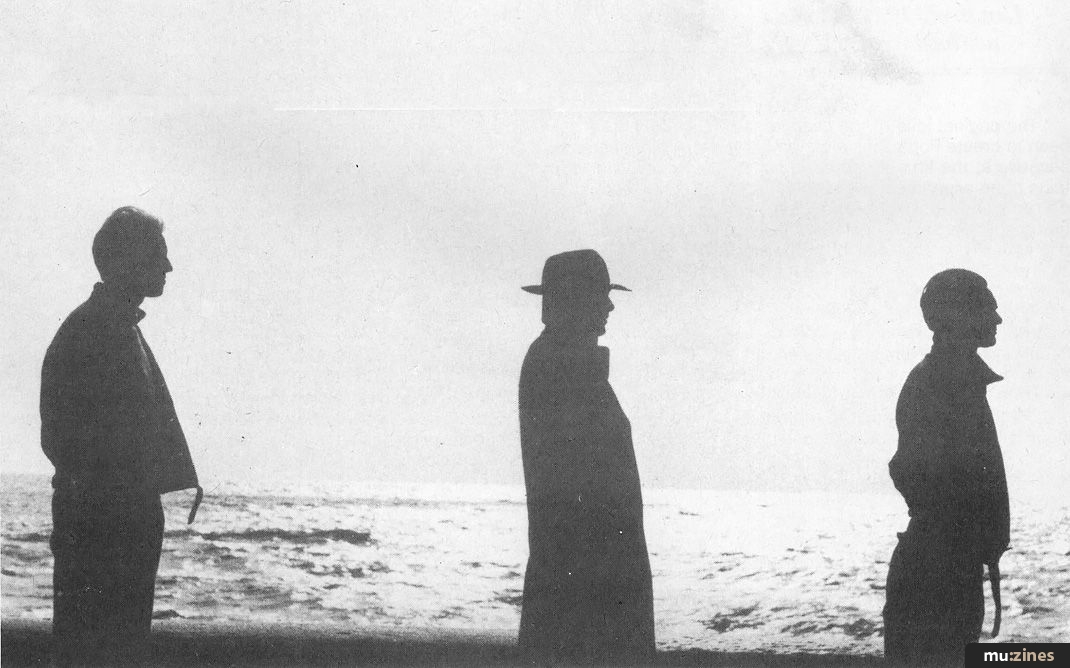
Many of the features of the modern Heaven 17 were defined at the time of the 'Music of Quality and Distinction' album, recorded in John Foxx's Garden studio (featured in ES&CM October). One of the artists on this album was pianist Nick Plytas who remains with the group, and the experience gained in production techniques was invaluable.
"The mix was a little harsh and we used too much echo on everything, but we enjoyed doing it. The idea for volume Two was to have people from other branches of the arts — such as film — to produce tracks. I remember getting very excited by the idea of a Ken Russell mix! We were very disheartened by some of the reactions to the album though, and it really stopped us working for a good couple of months. We had a good rest and then did 'Let Me Go', which I think is the best thing we've ever done, and went on to do 'Who'll Stop The Rain' and then the rest of the 'Luxury Gap' album.
"Now we can virtually run an entire song live and keep building on it until we're ready to record..."
Instruments
"We hired a Synclavier 1 from Keyboard Hire for the album and also used it on the Hot Gossip album, particularly for strings. It was all done in a fortnight with a lot of songs using the original multitracks, although 'Circus Of Death' and 'The Word Before Last' which were Human League songs were completely new and, I think, better than the originals. We were also using the LinnDrum and Jupiter 8 and we'll continue to use those despite the fact that we've now got a Fairlight. The MC-4 was getting quite laborious to programme and the Fairlight Music Composition Language and Rhythm Page will speed up that process. We hired in a Fender Rhodes and a Prophet, and on 'The Luxury Gap' there's the Drumatix, Bassline, System 100M and, of course, the string section, Nick Plytas on piano and John Wilson on guitar and Korg guitar synth, which is a monophonic one. They're building a guitar interface for the Fairlight at the moment which John will excel on!
Ian On The Fairlight
"I didn't know too much about the Fairlight until recently. We'd used the Synclavier which was alright, but you look at this ridiculous array of buttons and the one control knob to set everything and it seems fairly laborious. Eventually we went in for a demo at Syco Systems and I was amazed. I just couldn't believe how well designed the software was, it's so user-friendly. We bought Syco's interface box, the Conductor, which enables the Linn and the Fairlight and the Drumatix to link in real time, so now we can virtually run the entire song live and keep building it up without even having to record anything until you're ready.
"We find the Linn percussion sounds better than the Fairlight presets so we'll probably book into a studio and make our own percussion samples. There's something about the Linn that sounds so commercial, and you can do a lot with it on the mixing desk, especially the way Gregg Jackman treats it. We've started using the AMS digital delay to sample and hold a snare sound and trigger it off to replace the Linn snare each time we want it. There's an expansion for the Fairlight coming which will improve its sound performance at the top end on things like cymbals, and the current advantage of the Page R software is that it's not just for rhythms. You can assign different notes as well so it can be used to compose, together with the realtime sequencer and the Song Editor — we could sample a whole John Wilson piece and move it about, change the pitch and layer over it as we want."
The next Heaven 17 album should be a revelation. The combination of their sure commercial ear and the highest level of musical technology is bound to present a piece of the highest quality and distinction — meanwhile they have plans for a lot more video work. Changing levels of technology don't seem to overwhelm them at all, and they'll continue to combine electronics and acoustics in a unique way, as Martyn insists in closing.
"Things like 'Temptation' use Fairlight strings as a texture, in which case you can't really tell them from the real thing. If you use it as a lead line though you can tell the difference, so we'll still be using real strings as well. All of the next album will be composed on the Fairlight with demos done beforehand as usual. You just can't tell how it's likely to turn out though — we had no idea what 'Luxury Gap' would sound like before we started, for instance. A lot of people since then have bought Fairlights just as a tax loss, but on the next album I think we're probably going to be one of the first groups to use one as it's meant to be used."
More with this artist
Penthouse and Statement (Heaven 17) |
Heaven's Gate (Heaven 17) |
Just 17 (Heaven 17) |
Heaven Spent (Heaven 17) |
Just Seventeen (Heaven 17) |
How Men Are Now (Heaven 17) |
More from related artists
The Human League (Human League) |
Mass Hysteria (Human League) |
Human Engineering (Human League) |
Martyn Ware (Martin Ware) |
 Philip Oakey (Human League) |
Electric Soul (British Electric Foundation) |
Second Foundation (British Electric Foundation) |
Publisher: Electronic Soundmaker & Computer Music - Cover Publications Ltd, Northern & Shell Ltd.
The current copyright owner/s of this content may differ from the originally published copyright notice.
More details on copyright ownership...
Artist:
Heaven 17
Role:
Band/Group
Related Artists:
British Electric Foundation
Human League
Glenn Gregory
Martin Ware
Interview by Mark Jenkins
Help Support The Things You Love
mu:zines is the result of thousands of hours of effort, and will require many thousands more going forward to reach our goals of getting all this content online.
If you value this resource, you can support this project - it really helps!
Donations for November 2025
Issues donated this month: 0
New issues that have been donated or scanned for us this month.
Funds donated this month: £0.00
All donations and support are gratefully appreciated - thank you.
Magazines Needed - Can You Help?
Do you have any of these magazine issues?
If so, and you can donate, lend or scan them to help complete our archive, please get in touch via the Contribute page - thanks!



